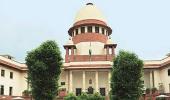The Supreme Court on Friday stressed legal enforcement, judicial measures and technology-driven initiatives to prevent child marriages in the country.

A bench of Chief Justice of India DY Chandrachud and Justice JB Pardiwala and Manoj Misra passed a slew of directions in this regard.
Under the title of "legal enforcement", states and Union Territories were directed to appoint officers solely responsible for discharging the functions of Child Marriage Prohibition Officers at the district level.
It said to enable personal accountability and ensure immediate preventive measures are taken against any planned solemnisation of child marriages, each state and UT will upload quarterly reports from CMPOs on their official websites.
The ministries of women and child development and home in each state and UT were further directed to conduct quarterly performance reviews of CMPOs and law enforcement agencies to assess among others, the effectiveness of child marriage prevention initiatives and response times and outcomes of reported case.
Towards "judicial measures", all magistrates vested with authority under Section 13 of the Prohibition of Child Marriage Act, 2006, were ordered to take proactive measures, including issuing suo-motu injunctions to prevent the solemnisation of child marriages.
"Magistrates are encouraged to particularly focus on 'auspicious days' known for mass weddings, when the occurrence of child marriages is notably high," the bench said.
The Centre and state governments were directed to work in tandem to assess the feasibility of establishing special fast-track courts exclusively to handle cases under the PCMA.
States and UTs were directed to develop an annual action plan to prevent child marriages, incorporating key performance indicators that reflect local cultural and social contexts within communities.
"All states and Union Territories are directed to integrate comprehensive sexuality education into school curricula in line with the framework prescribed by the World Health Organisation and leading thoughts in the field of CSE (comprehensive sexuality education)," the bench said.
It said police officers, particularly those in the Special Juvenile Police Units, must undergo training focused on the legal aspects of the PCMA, child rights, and sensitivity towards cases involving minors.
"The Ministry of Women and Child Development is directed to consider the viability of implementing comprehensive educational incentive programs specifically targeted at girls at risk of child marriage," the apex court said.
The bench directed the National Legal Services Authority to formulate a standard operating procedure towards legal-support services, and long-term rehabilitation plans concerning child marriage victims for lawyers and law-enforcement officers.
The ministry of home affairs, in collaboration with the ministry of women and child development and the NALSA, was directed to create a designated portal for online reporting of child marriages.
"Each sate and UT shall make all endeavours to disseminate information against child marriage across all print, digital and social media – with a focus on regions where child marriages are likely to occur in high numbers," the bench said.
It directed the relevant ministries of the Union government to recommend the allocation of a dedicated yearly budget for each state specifically aimed at preventing child marriage and supporting affected individuals.
The bench directed that copy of its judgment be sent to the secretaries of all concerned ministries, states, UTs and others for compliance.
The apex court's verdict came on a plea seeking stronger enforcement mechanisms to curb child marriages.











 © 2025
© 2025